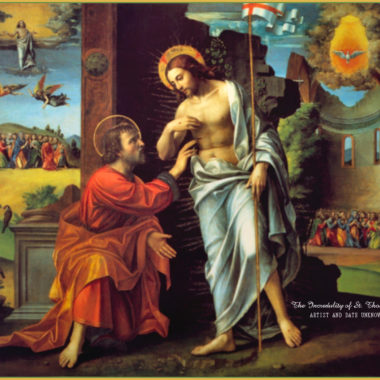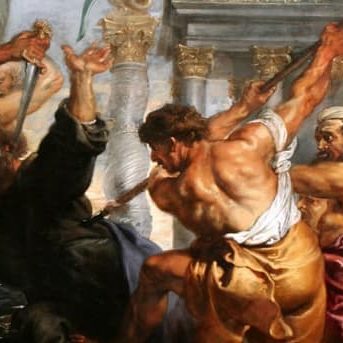St Thomas the Apostle of Jesus and the founder of the Church in India is an apostle and missionary par excellence. He holds a unique place in the college of the Apostles of Jesus because of his unique personality. He was most probably from Galilee and his whereabouts when he became a disciple of Jesus is not known. He was either a carpenter or a fisherman.
Christians of India, those of the Eastern Tradition, consider St Thomas as the founder of their Church in India. As founder, this apostle has a very special place in the lives of these Christians. They consider him as their muthappan, the great grandfather. This patriarchal relation with the Apostle surely brings in an element of mutual belongingness among these Christians; as children of the same great grandfather they all partake of the same patrimony and as such are inheritors of the apostolic spirituality of St Thomas.
Unlike the other few Apostles, the exact context in which Thomas was called by Jesus is not described in the gospels. John, James, Peter and Andrews were called from the place of their work. Mathew also was called in the same way. However, there is no information about the whereabouts of the call of Thomas by Jesus.
What his place was in the college of the Apostles is not clear. Yet, he is sure to have held an important place among them. He was originally from Galilee and by profession he was a fisherman before he was called by Jesus. His name occurs in all the Synoptic lists of the Apostles (Mt 10:2-4; Mk 3:16-19; Lk 6:14-16) and in the Acts (1:13). The position of Thomas in the list of the twelve Apostles mentioned there may indicate that he was regarded in the early Church as neither the most nor the least important of the twelve. But, we are not sure if the Gospel list of the Twelve indicates any kind of hierarchy. In the gospels according to Mark and Luke, Thomas is mentioned after Mathew while the evangelist Mathew mentions Thomas before himself. But in the Acts of the Apostles the name of Thomas comes before that of Mathew. Chrysostom explicitly states that Mark lists the Apostles according to the order of their dignity and that Thomas is inferior to Mathew. In one of the poems on Thomas, Jacob of Sarug makes Thomas himself say that he is the seventh in the community of the Apostles. In some of the liturgical calendars of the East, Thomas is introduced as the seventh apostle. Seven is considered as the perfect number. Perhaps Thomas is regarded as the perfect or ideal disciple of Christ. In the Gospel of John, Thomas plays a very distinctive role as one who is closer to Jesus than all other apostles. He is named only Thomas in Mathew 10:3, Mark 3:18; Luke 6:15; Acts 1:13, but in John in three places he is further identified as Didymus (twin). No incident is recorded about him in the synoptics or in the Acts, but in the fourth Gospel he becomes prominent in the closing chapters. In Jn 21:2, Thomas is named directly after Peter and before John and James. Presumably it is an evidence for the reputation and reverence Thomas held in the early Church.



